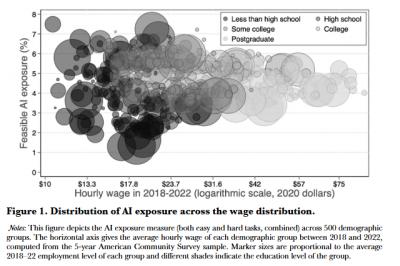According to this paper (46 page PDF) from Daron Acemoglu, the economic impact of AI is estimated to be "non-trivial but modest – no more than a 0.66% increase in total factor productivity (TFP) over 10 years." Why? Irving Wladawsky-Berger gives us the summary in this article. "Only about 20% of the tasks in US jobs might be exposed to AI." Also, when automation replaces workers, it won't increase productivity; the tools will be of the 'so-so' kind, which are only good enough to be able to do the same work. And we're not seeing the potential for big gains. Goldman Sachs's Jim Covello asks, "What $1tn problem will AI solve?" He argues, "truly life-changing inventions like the internet enabled low-cost solutions to disrupt high-cost solutions even in their infancy, unlike costly AI tech today." The problem with this discussion, in my view, is that it views the rest of the economy - that is, all of us - as passive recipients of AI. But the economic impact of AI will have a lot to do with what we do, not just what AI can do.
Today: 0 Total: 904 [] [Share]




